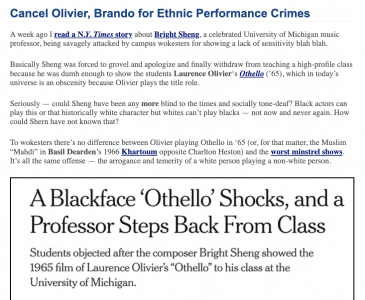Laurence Olivier‘s Othello (1965) is a capturing of the National Theatre Company’s 1964-65 staging of Shakespeare’s classic tragedy. Directed by Stuart Burge. It stars Olivier, Maggie Smith, Joyce Redman and Frank Finlay; Derek Jacobi and Michael Gambon made their film debuts in it.
“Olivier’s Othello is history already; it’s something to remember. And Othello isn’t even much of a ‘movie’. Just a reasonably faithful (one assumes) record of a stage interpretation. After thirty-five years in movies and masterpiece upon masterpiece acclaimed in the theatre, Olivier still could not raise the money to do a real movie version of his Othello. And of his Macbeth, acclaimed as the greatest since [something], we have not even a record.
“Olivier’s greatness is in his acting; as a movie director, he is merely excellent and intelligent.
“Yet his Shakespearean performances deserve — at the minimum — the kind of movie he or other talented directors might do, what he brought to Henry V, Hamlet, Richard III. It is a scandal, an indictment of Anglo-American civilization and values, that eight million dollars can go into a spy spoof, twelve into a comic chase, twenty-seven into a spectacle, and for Olivier in Othello, we and history must content ourselves with a quickie recording process.
“And yet the joke is on the spoofs, chases and spectacles. For Othello lives.
“Olivier is the most physical Othello imaginable. As a lord, this Othello is a little vulgar — too ingratiating, a boaster, an arrogant man. Reduced to barbarism, he shows us a maimed African prince inside the warrior-hero, Iago’s irrationality has stripped him bare to a different kind of beauty. We are sorry to see it, and we are not sorry either. To our eyes, the African prince is more beautiful in his isolation than the fancy courtier in his reflected white glory.
“I saw Paul Robeson‘s Othello [for the Royal Shakespeare Company in Stratford in April 1959], and he was not black as Olivier is; Frank Finlay can hate Olivier in a way Jose Ferrer did not dare — indeed did not have the provocation — to hate Robeson. Possibly Negro actors need to sharpen themselves on white roles before they can play a Negro. It is not enough to be: for great drama, it is the awareness that is everything.
“Every time we single out the feature that makes Olivier a marvel — his lion eyes or the voice and the way it seizes on a phrase — he alters it or casts it off in some new role, and is greater than ever. It is no special asset, [but] the devilish audacity and courage of this man.
“Olivier, who, for Othello, changed his walk and talk, is a man close to sixty who, in an ordinary suit in an ordinary role, looks an ordinary man, and can look even smaller in a role like Archie Rice in The Entertainer. What is extraordinary in Olivier is what’s inside, and what is even more extraordinary is his determination to give it outer form.” — from a Pauline Kael essay that appeared in McCall’s in March 1966.
“Cancel Olivier, Brando for Ethnic Performance Crimes,” posted on 10.21.21:













